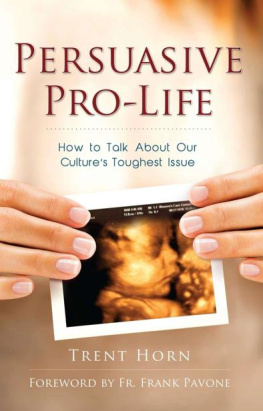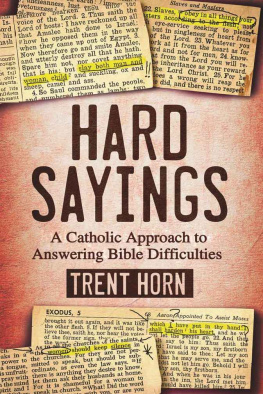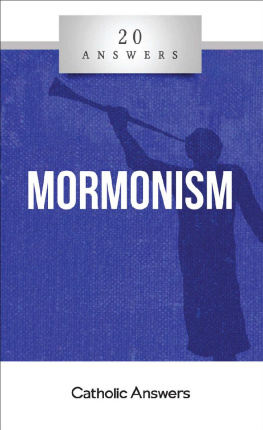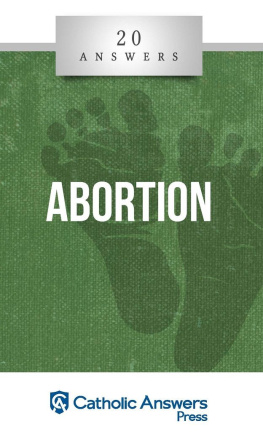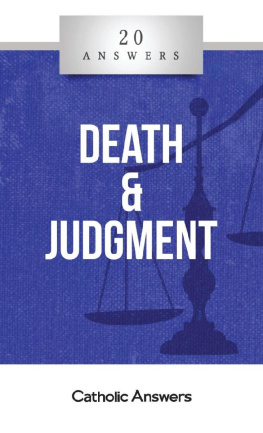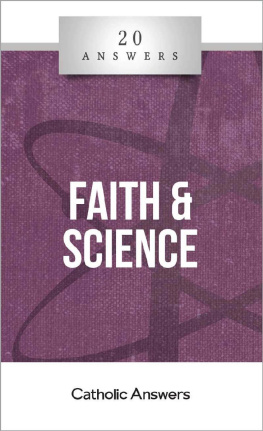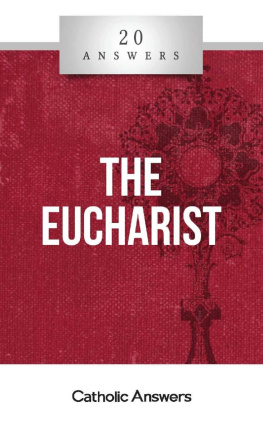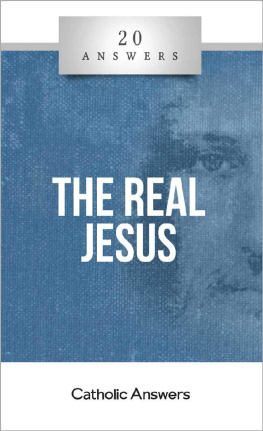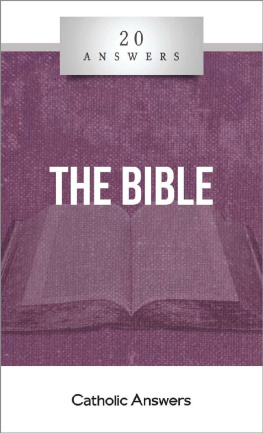Trent Horn - 20 Answers- God
Here you can read online Trent Horn - 20 Answers- God full text of the book (entire story) in english for free. Download pdf and epub, get meaning, cover and reviews about this ebook. year: 2016, publisher: Catholic Answers Press, genre: Religion. Description of the work, (preface) as well as reviews are available. Best literature library LitArk.com created for fans of good reading and offers a wide selection of genres:
Romance novel
Science fiction
Adventure
Detective
Science
History
Home and family
Prose
Art
Politics
Computer
Non-fiction
Religion
Business
Children
Humor
Choose a favorite category and find really read worthwhile books. Enjoy immersion in the world of imagination, feel the emotions of the characters or learn something new for yourself, make an fascinating discovery.
- Book:20 Answers- God
- Author:
- Publisher:Catholic Answers Press
- Genre:
- Year:2016
- Rating:5 / 5
- Favourites:Add to favourites
- Your mark:
- 100
- 1
- 2
- 3
- 4
- 5
20 Answers- God: summary, description and annotation
We offer to read an annotation, description, summary or preface (depends on what the author of the book "20 Answers- God" wrote himself). If you haven't found the necessary information about the book — write in the comments, we will try to find it.
20 Answers- God — read online for free the complete book (whole text) full work
Below is the text of the book, divided by pages. System saving the place of the last page read, allows you to conveniently read the book "20 Answers- God" online for free, without having to search again every time where you left off. Put a bookmark, and you can go to the page where you finished reading at any time.
Font size:
Interval:
Bookmark:
20 Answers
God
Trent Horn

20 Answers: God
Trent Horn
2015 Catholic Answers
All rights reserved. Except for quotations, no part of this book may be reproduced or transmitted in any form or by any means, electronic or mechanical, including photocopying, recording, uploading to the Internet, or by any information storage and retrieval system, without written permission from the publisher.
Published by Catholic Answers, Inc.
2020 Gillespie Way
El Cajon, California 92020
1-888-291-8000 orders
619-387-0042 fax
catholic.com
Printed in the United States of America
978-1-941663-65-3
978-1-941663-66-0 Kindle
978-1-941663-67-7 ePub
Table of Contents
Introduction
I dont believe in God any more than I believe in Santa Claus. Have you ever heard someone say something like this? I have. In fact, I have known several people who used to be religious but abandoned their faith because they felt they had outgrown God.
But the thing they outgrew was not God. Instead it was a false conception of Godone that they may have even learned about in Sunday school. Their idea of God was, in the words of twentieth-century Bible scholar J.B. Phillips, too small.
This booklet is an answer to anyone with that false, too-small idea of God: to those who say God doesnt exist or that hes just the universe; that God is a physical being like us; that God created the universe but doesnt care about it anymore.
In response to these views and others, Ill explain why Christians believe in the one true God, with evidence from reason, Sacred Scripture, and Sacred Tradition that gives us good reason to believe in the God who is, as the Athanasian Creed tells us, one person of the Father, another of the Son, and another of the Holy Spirit... all one, the glory equal, the majesty coeternal.
1. What is God?
Although concepts of God differ across the world, they all usually describe him as the supernatural creator of the universe. One useful but incomplete definition comes from the old Baltimore Catechism : When we say that God is the Supreme Being we mean that he is above all creatures, the self-existing and infinitely perfect spirit. I am the first, and I am the last, and besides me there is no God (Is. 44:6).
According to the Western philosophical tradition, God is necessary (he cannot fail to exist), infinite (without limit), eternal (not bound by time), immaterial (not bound by space), omnipotent (all-powerful), and omniscient (all-knowing). Finally, God is all-good: the perfect embodiment of the virtues of love, justice, and every other good we know.He is, as St. Anselm of Canterbury declared, the being than which no greater can be thought.
Because God is infinitely beyond us, we can only understand him in indirect ways. We can know what God is not . For example: God exists beyond space so he is not made of matter (the stuff that occupies space). God is morally perfect so he does not sin. God is beyond time so he has no beginning or end.
When people try to define what God is, they often make the mistake of treating him like any other being in the universe, albeit one with unlimited attributes. But classical theists like St. Thomas Aquinas did not consider God to be one being among many (like a special star floating far away out there). Instead they considered God to be being or existence itself. What does that mean?
According to St. Thomas, in all creatures there is a difference between what they are (their essence) and the fact that they are (their existence). Just because something is a human or is a fish, for example, does not tell us if that particular thing, be it man or mackerel, has to exist. For example, there are many true statements that can be made about dinosaurs and their unique essence, but the statement that dinosaurs exist is not one of them, since dinosaurs went extinct millions of years ago.
God is different because his essence, or what he is, is existence. God doesnt just happen to exist like humans or other species on Earth; he must exist because he is existence itself. This is the meaning of Gods name I AM that was revealed to Moses in the burning bush (Exod. 3:14).
The Catechism of the Catholic Church (CCC)explains it this way:
The revelation of the ineffable name I AM WHO AM contains then the truth that God alone IS. The Greek Septuagint translation of the Hebrew scriptures, and following it the Churchs Tradition, understood the divine name in this sense: God is the fullness of Being and of every perfection, without origin and without end. All creatures receive all that they are and have from him; but he alone is his very being, and he is of himself everything that he is (CCC 213).God must exist because he is the ground of existence; or existence is what he is and every created thing exists only because God sustains it. As St. Paul says of God, he himself gives to all men life and breath and everything...In him we live and move and have our being.If God is being (not just a being) who exists without limit, then it follows that God is not limited in his power, knowledge, love, goodness, and ability to exist beyond space and time.
But even if God could be proven to exist, would it be possible to understand such an infinite being? Here we must distinguish between basic understanding and advanced comprehension. I dont fully comprehend how every part of a nuclear reactor works, because Im not a nuclear engineer. But the facts provided by nuclear engineers, which are printed in books, allow me to have a basic understanding of how a nuclear reactor works. At a basic level, I understand that we can use nuclear energy to heat water, which creates steam, which spins turbines, which in turn create electricity, although I do not fully comprehend exactly how nuclear reactors work.
Similarly, I may not fully comprehend how God knows all truths or how he created the world, but I can understand that such tasks are not impossible for an infinite being like him. According to the Catechism :
God transcends all creatures. We must therefore continually purify our language of everything in it that is limited, image-bound or imperfect, if we are not to confuse our image of Godthe inexpressible, the incomprehensible, the invisible, the ungraspablewith our human representations. Our human words always fall short of the mystery of God (CCC 42).2. What are some false views of God?
Before we explore the attributes and essence of the one true God, lets first examine three common false views of the nature of God.
Polytheism: Monotheists, such as Christians, Muslims, and Jews, believe that only one God exists. Polytheists, on the other hand, believe that many gods exist. The ancient followers of Greek and Roman mythology were examples of polytheists.
Not all ancient Greeks and Romans believed in many gods, however. Philosophers such as Plato and Aristole believed in a supreme being, or God, who created all of reality. In Metaphysics , Aristotle said that gods like Zeus were myths but the true God is a living being, eternal, most good, so that life and duration continuous and eternal belong to God; for this is God.
Unlike the gods of mythological pantheons, the one true God is not confined in any way, not even by space or time. In fact, the orderly behavior of the universe according to fixed, natural laws is evidence for monotheism. If polytheism were true, we would expect the natural order to be disrupted by disagreements or infighting among the gods.
Pantheism: The Pontifical Council for Interreligious Dialogue defined pantheism as the belief that every element of the universe is divine, and the divinity is equally present in everything. There is no space in this view for God as a distinct being in the sense of classical theism.
Next pageFont size:
Interval:
Bookmark:
Similar books «20 Answers- God»
Look at similar books to 20 Answers- God. We have selected literature similar in name and meaning in the hope of providing readers with more options to find new, interesting, not yet read works.
Discussion, reviews of the book 20 Answers- God and just readers' own opinions. Leave your comments, write what you think about the work, its meaning or the main characters. Specify what exactly you liked and what you didn't like, and why you think so.


